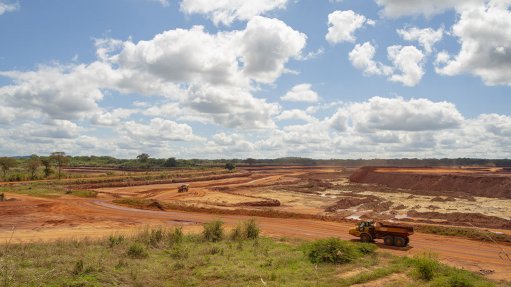Hurdles stifle sustainable industry growth


HURDLES AHEAD Challenges need to be addressed to ensure long-term viability of the mining industry
Despite significant growth and investment in recent years in the Mozambique mining industry, ongoing challenges need to be addressed to ensure sustainable development and growth, says commodities market analyst Core Consultants founder and MD Lara Smith.
The discovery of vast natural gas reserves off the coast of Mozambique has benefited the mining industry. In 2012, Italian energy company Eni discovered the offshore Mamba gasfield, in Cabo Delgado province, which is believed to be one of the largest natural gas discoveries in the world. This encouraged investment in the country’s energy sector.
The coal mining sector has also been a significant contributor to Mozambique’s economy, with the country being one of the largest coal exporters in Africa.
However, the industry has faced challenges, owing to falling commodity prices and weak demand, which has led to a slowdown in production and investment, Smith notes.
Particularly in remote areas, limited transport infrastructure, inadequate power supply and weak logistics systems have made it difficult to transport equipment and materials to such mining sites, as well as from them should resources companies elect to export products to international markets.
In these instances, Smith says that, despite many mines having significant mineralisation that they can explore, they are locked into a difficult situation from an infrastructure perspective.
Prevailing Insurgency The ongoing security crisis in Cabo Delgado has been detrimental to the development of the country’s mining industry.
“Since 2017, the region has been plagued by violence from insurgents, which has led to the displacement of thousands of people and disrupted economic activity in the area,” Smith explains.
The impact of the insurgency on the mining industry has resulted in the deterioration of regional security and delays in infrastructure development.
Many operations also had to employ private security to protect facilities from attacks by insurgents. Security threats include mining equipment being vandalised and transport systems being disrupted, with investment also being deferred.
“Companies are hesitant to invest in mining operations, owing to the high risk of attacks and the uncertainty of the situation,” she notes.
Consequently, miners have to incur additional operational costs, as well as deal with disruptions in productivity at operations when activities are suspended.
Smith emphasises that urgency is needed to resolve the security crisis to ensure the safety and stability of the region, and to promote the development of the mining industry and attract investment, especially foreign direct investment (FDI).
The mining industry has responded to the conflict in the northern part of the country by suspending operations, bolstering security measures, engaging with stakeholders and advocating for a resolution.
Government’s response to the insurgency includes deploying military forces, seeking international support, enhancing regional cooperation and also engaging with stakeholders.
While government has tried to address the conflict, Smith says the root causes – which include various economic and political grievances – have not been addressed; therefore, “long-term peace is tenuous at best”.
She notes that regional cooperation with fellow Southern African Development Community member countries, and dialogue with stakeholders, have not appeared to have had a significant impact on the situation thus far.
Post-Pandemic Growth
Mozambique’s mining industry has also had to deal with the sovereign debt crisis and adverse weather in recent years, as well as reduced FDI, owing to the impact of Russia’s invasion of Ukraine and the Covid-19 pandemic.
The mining sector’s being vulnerable to the impacts of climate change can lead to challenges such as disruptions in the development and use of infrastructure, a scarcity in water resources and changes to the environment.
However, in 2022, the industry recovered strongly, largely driven by the oil industry.
Mining production increased by 16.8% in December 2022, and the World Bank expects this recovery to continue until 2025. The growth is expected to be driven by the liquefied natural gas industry and high commodity prices.
Smith adds that other issues, such as regulations, skills shortages, environmental concerns and corruption, need to be addressed to ensure that the industry continues to develop and thrive.
As Mozambique’s mining regulatory environment is still evolving, there are not yet clear and stable regulations to provide comfort for certain investor groups, and although this is being addressed, more needs to be done.
More transparency and accountability are required to address corruption impacting on the sector, she says.
The mining industry must adopt sustainable practices that reduce the impact of climate change and ensure the long-term viability of the mining industry, Smith concludes.
Comments
Press Office
Announcements
What's On
Subscribe to improve your user experience...
Option 1 (equivalent of R125 a month):
Receive a weekly copy of Creamer Media's Engineering News & Mining Weekly magazine
(print copy for those in South Africa and e-magazine for those outside of South Africa)
Receive daily email newsletters
Access to full search results
Access archive of magazine back copies
Access to Projects in Progress
Access to ONE Research Report of your choice in PDF format
Option 2 (equivalent of R375 a month):
All benefits from Option 1
PLUS
Access to Creamer Media's Research Channel Africa for ALL Research Reports, in PDF format, on various industrial and mining sectors
including Electricity; Water; Energy Transition; Hydrogen; Roads, Rail and Ports; Coal; Gold; Platinum; Battery Metals; etc.
Already a subscriber?
Forgotten your password?
Receive weekly copy of Creamer Media's Engineering News & Mining Weekly magazine (print copy for those in South Africa and e-magazine for those outside of South Africa)
➕
Recieve daily email newsletters
➕
Access to full search results
➕
Access archive of magazine back copies
➕
Access to Projects in Progress
➕
Access to ONE Research Report of your choice in PDF format
RESEARCH CHANNEL AFRICA
R4500 (equivalent of R375 a month)
SUBSCRIBEAll benefits from Option 1
➕
Access to Creamer Media's Research Channel Africa for ALL Research Reports on various industrial and mining sectors, in PDF format, including on:
Electricity
➕
Water
➕
Energy Transition
➕
Hydrogen
➕
Roads, Rail and Ports
➕
Coal
➕
Gold
➕
Platinum
➕
Battery Metals
➕
etc.
Receive all benefits from Option 1 or Option 2 delivered to numerous people at your company
➕
Multiple User names and Passwords for simultaneous log-ins
➕
Intranet integration access to all in your organisation



















